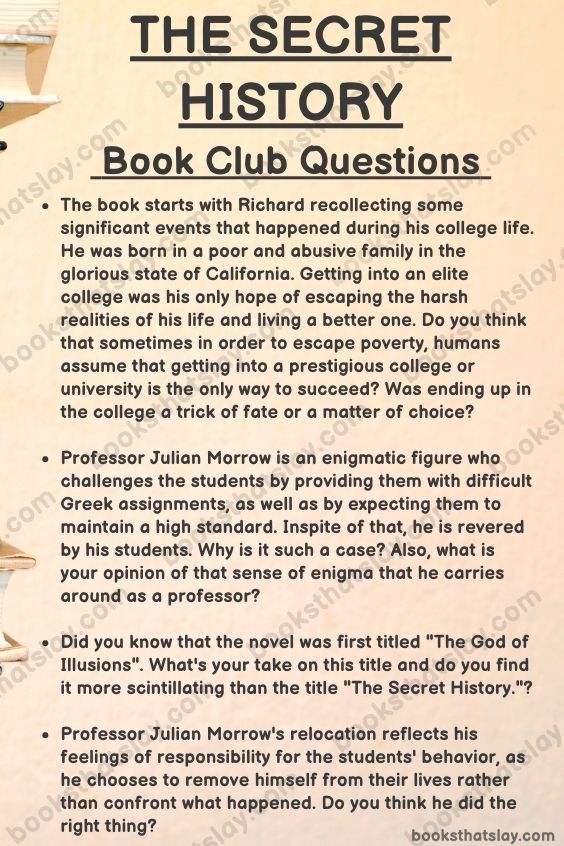10 The Secret History Book Club Questions
Dark mysteries and unsettling secrets – that’s what you are about to delve in.
Donna Tartt’s The Secret History is a timeless masterpiece that introduces a cast of complex characters whose lives intertwine in a dangerous dance of obsession and privilege.
While the tragic climax is well-known, it’s the journey there that truly grips the soul.
Explore the novel with this list of book club questions for The Secret History.
Let’s begin.

The Secret History Book Club Questions For Discussion
- The book starts with Richard recollecting some significant events that happened during his college life. He was born into a poor and abusive family in the glorious state of California. Getting into an elite college was his only hope of escaping the harsh realities of his life and living a better one.
Do you think that sometimes in order to escape poverty, humans assume that getting into a prestigious college or university is the only way to succeed? Was ending up in college a trick of fate or a matter of choice?
- Professor Julian Morrow is an enigmatic figure who challenges the students by providing them with difficult Greek assignments, as well as by expecting them to maintain a high standard. In spite of that, he is revered by his students.
Why is it such a case? Also, what is your opinion of that sense of enigma that he carries around as a professor?
- Did you know that the novel was first titled “The God of Illusions”. What’s your take on this title, and do you find it more scintillating than the title “The Secret History.”?
- The conflicts between the characters are mainly driven by envy and jealousy, as Bunny desperately attempts to pretend his family is still wealthy while Henry Winter’s privileged background is resented by some of the other characters. Richard is also often excluded from the group because he is not as well-off.
How does this play out in the book? Is power and privilege more important than friendship when it comes to such a close-knit group of people?
- Edmund Corcoran, aka “Bunny”, comes from Connecticut and was once wealthy, but his family has since lost its money. Henry Winter is a trust fund student from St. Louis; Francis Abernathy is also a trust fund student and is gay; Camilla and Charles MacAulay are a pair of fraternal twins from Virginia; and Richard Papen is from a working-class family in inland California.
What is your take on such character development by Donna Tartt in the novel The Secret History?
- Do you think the novel explores the circumstances and lasting effects of someone’s death in the right manner? Was being orchestrated by the group of people the primary reason behind such a tragedy?
- Donna Tartt uses the setting of Hampden College to create an atmosphere of mystery by introducing characters with strange backgrounds and secrets, as well as having their classes taught by a mysterious professor who is rarely seen. Additionally, it serves as a microcosm of a larger society, with its various cliques and hierarchies. The reader is able to identify with the characters’ struggles for acceptance and understanding among peers.
Does the novel accurately reflect a college milieu or is it an idealized version of college life?
- The bacchanal ritual symbolizes the students’ attempt to connect with Dionysus and to “lose control completely.” It reflects their desire for power and a sense of freedom from social constraints.
As adults, do you feel that the students were granted too much freedom too early in their lives? Also, in spite of being from well-to-do families, what social restrictions do you think were placed on the students that made them act out in such a manner?
- Henry’s suicide is symbolic of his own guilt and responsibility for Bunny’s death, as well as an attempt to protect the others from further repercussions.
Do you think it serves as a stark reminder of the consequences that violence can have in the lives of those who perpetrate it? Additionally, how does Richard’s return to California connect with the consequences of the actions that the group has taken?
- Professor Julian Morrow’s relocation reflects his feelings of responsibility for the students’ behavior, as he chooses to remove himself from their lives rather than confront what happened.
Do you think he did the right thing?
If you liked these questions, here are a few other options for you to explore.